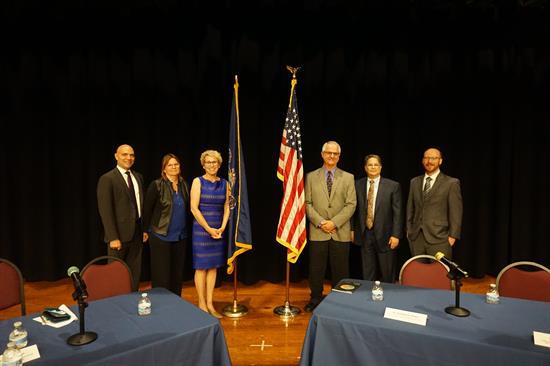Pennsylvania: birthplace of the biotech revolution?
Washington,
June 20, 2025
Originally published in The Center Square
Written by Christina Lengyel (Photo/Office of Rep. Chrissy Houlahan) (The Center Square) - The “bioindustrial revolution” is coming. Pennsylvania lawmakers want the commonwealth to be at its forefront. Gov. Josh Shapiro has made the biotech industry a core focus of his work in the governor’s office. Other lawmakers in the state are now doubling down on that commitment. Last week, U.S. Rep. Chrissy Houlahan, D-West Chester, joined the National Security Commission on Emerging Biotechnology on its Pennsylvania stop for the Biotech Across America Tour. The Air Force veteran, engineer and congresswoman hosted a variety of stakeholders from schools to private companies to policy groups to discuss Pennsylvania’s role in the future of the field. “Breakthroughs in biotechnology are happening every day here and across the nation, and with the combined work of the Commission and my colleagues in Congress, we have an opportunity right now both to stay ahead of the global competition and improve everything from medicines and manufacturing to materials and sustainability,” said Houlahan. “It’s urgent that we all work together to do so. Our success and security as a nation depend on it.” The Center Square's attempt to contact her office for comment was unsuccessful. Houlahan’s rhetoric echoes the sentiment expressed by Shapiro as he highlighted various investments to the state’s technology infrastructure, from research labs in Erie to new development for life sciences companies in the Philadelphia Navy Yard. The governor has noted that while the state is fourth in the nation for research and development spending, it’s only pulling in 3% of venture capital in life sciences. The Center Square recently investigated the federal spending that has helped make the University of Pittsburgh, Penn State, and the University of Pennsylvania global leaders in scientific research. Grants supporting new technologies using AI demonstrate how the field has propelled forward at light speed. Visiting NSCEB commissioners highlighted work being done at the local level to promote STEM education with representatives from several community colleges and smaller universities, even holding the event at the Chester County Technical College High School in Phoenixville. The group went on to tour a biotech company devoted to vision, Ocugen in Malvern. The company focuses on developing gene therapies for diseases that cause blindness.“Pennsylvania can serve as a blueprint for developing a strong biomanufacturing base, and the opportunities for continued growth are significant,” said Paul Arcangeli, NSCEB Commissioner. “This community is poised to capitalize on the NSCEB’s recommendations, especially around educating the future bio-workforce and expanding workforce training opportunities.” Those recommendations come from a report issued by the commission in April which assessed actions Congress and the federal government could take to support the nation’s biotechnology goals. The report calls for a “private-public” partnership to compete with China, which currently dominates the field, posing potential risks to U.S. technological independence. “We stand at the edge of a new industrial revolution, one that depends on our ability to engineer biology,” begins the report. “Emerging biotechnology, coupled with artificial intelligence, will transform everything from the way we defend and build our nation to how we nourish and provide care for Americans.” The report offers two visions for the future, one in which biotechnology is used to feed people using fewer resources, cure diseases, and maintain the U.S. military’s global hegemony. The other is one in which China holds exclusive rights to intellectual property, leaving Americans sick, hungry and defenseless against superhuman military opponents. It may sound like something out of a dystopian work of science fiction, but for the bipartisan commission, it’s of urgent importance. They say that we’re at a critical point that demands a minimum $15 billion federal investment over the next five years to make it through the quick-closing window. For Pennsylvania, that includes the $30 million pledged toward life sciences in Gov. Josh Shapiro’s proposed 2025-2026 budget. It also reaps the rewards of massive capital investment in AI technology within the state, one of the primary drivers of new developments in biotechnology. “The future of our biotech workforce depends on developing a solid foundation for educational programs to thrive at all levels,” said Dr. Angela Belcher, NSCEB Commissioner. “The innovative work being done here in Pennsylvania is a great example of how a well-supported ecosystem can strengthen the future for an entire industry.” |
In the News



